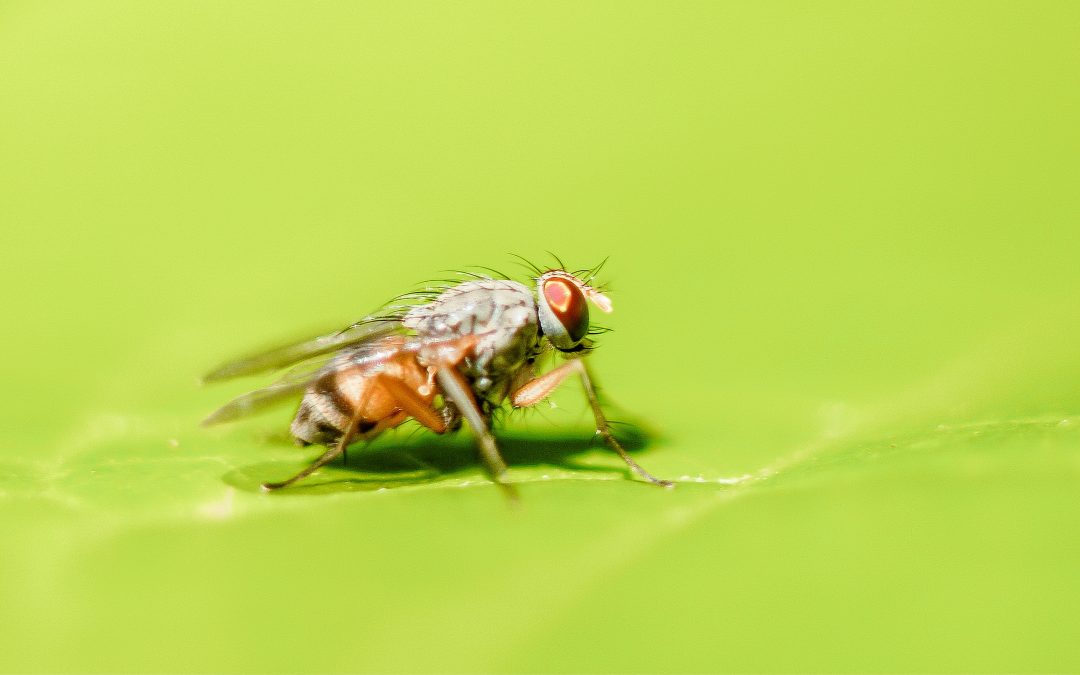Prions are proteins that can fold in multiple, structurally distinct ways. These folds can be transferred to other prions, and this propagation results in diseases that act like bacterial infections. In addition to scrapie and CJD (a human disease that causes brain tissue to rapidly decay, leaving the brain with a sponge-like texture), prions are also suspected as the cause of bovine spongiform encephalopathy (BSE, a.k.a. “mad cow disease”). However, more and more research has been turning up other possible effects and uses of prion-like folding proteins. In fact, we’ve written about the topic before, discussing how plants might track time for flowering and other environment-dependent processes using prions.
One discovery in the realm of folding proteins came in 2016 from the Stowers Center for Medical Research in Kansas City. Their research was focused on studying memory formation in Drosophila fruit flies. The researchers were looking at the function of a protein called Orb2. They found that when male flies were given a drug to make Orb2 inactive, the flies became much worse at forming certain memories. The researchers tested the flies by measuring how long it took them to give up courtship of females after the females had expressed no interest in mating. The flies with Orb2 disabled were bad at remembering when they had been rejected, and continued courting long after they should have learned that their attempts were useless.
As the scientists looked deeper, they found another protein called JJJ2 that interacts with Orb2. JJJ2 allows Orb2 to change shape and fold the same way prions do. Folding allows Orb2 to aggregate, and it turns out that this aggregation can allow flies to learn faster. When the researchers increased the levels of JJJ2 in the flies, they found that the flies could learn that they had been rejected by females within 2 hours of courting. In flies with normal levels of JJJ2, it usually takes about 6 hours for the flies to give up on an unreceptive female. This new memory also showed evidence of lasting for several days. However, JJJ2 doesn’t make the flies more intelligent; it only accelerates the process of developing memories that would have formed eventually. Essentially, it lowers the threshold of experience required for memory formation.
Knowing that clumps of folded, prion-like Orb2 proteins can store long-lasting memories in flies, the question becomes how does this translate to humans. People possess a version of Orb2 called CPEB, so it is possible that the type of memory formation observed in flies may also occur in people as well. If we can develop a strong understanding of how the brain creates and recalls memories, we might be able to discover a key to restore that process in people with diseases like Alzheimer’s, where memory functionality is impaired. However, this study only looked at the behavior of one protein, specifically for interactions with long-term memory. It is likely that proteins involved in other biochemical processes behave similarly, contributing to things like immune cell memory (i.e. how immune cells “remember” biological threats). With additional study, it could turn out that protein accumulation is a fundamental way that memory works.
Powers Scientific has been helping advance insect research like this for over 30 years with our Drosophila and Small Insect Chambers that are designed for applications involving Drosophila melanogaster. Our chambers have a 15-60°C programmable temperature range, making them flexible for a multitude of applications beyond Drosophila research as well, including studies with mosquitos, sand flies or many other types of insects. A digital and programmable clock controls warm LED lighting on the Level 2 and 3 models for day/night control over lighting conditions in the chamber. The Level 3 chambers are controlled by thermoelectric (Peltier) coolers and come equipped with ultrasonic humidity generators capable of providing the relative humidity conditions insects enjoy.
For more information, see our Drosophila and Small Insect Chambers product page, visit our Contact Us page, or call us at (800) 998-0500.

